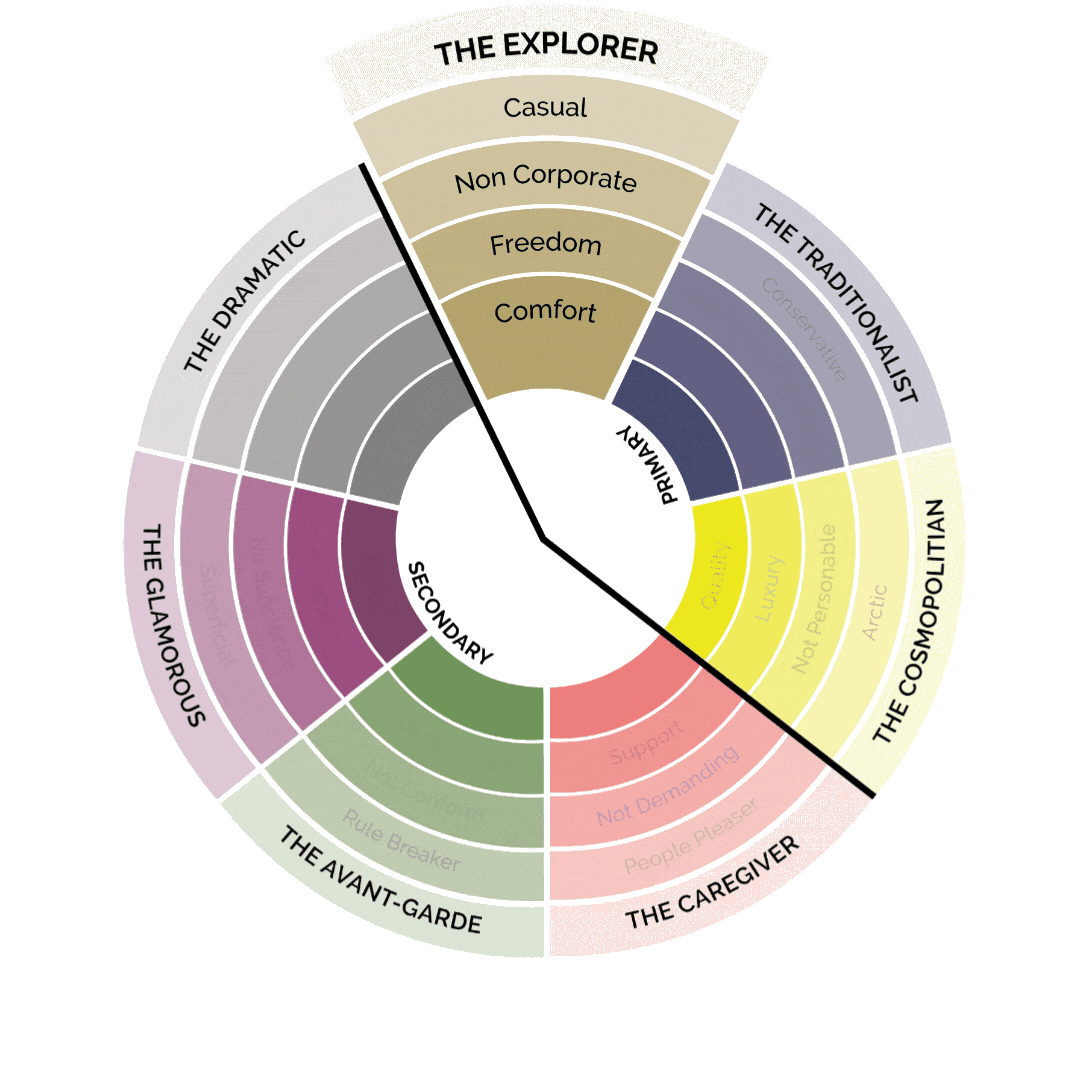42 Most Common Mistakes in Sales
Part 1: Why You Fail to Make an Impactful First and Lasting Impression in Sales
When you are in sales, your first impression on clients is everything. People want to see that you are someone they can trust before they decide to invest their money. They want to know you have their best interests in mind and are not just looking to hit your commission goals. However, many sales professionals make common mistakes that undermine their credibility and prevent them from making a lasting impact on potential clients.
You’re Not Listening to Your Client
Many sales professionals will give their clients space to talk, but they won’t truly be listening. They will just be waiting to tell people what they have to say. If you want to make a good impression, pay attention to your clients, and understand the message they are sending. You must ensure you are picking up on the right cues and genuinely responding to what they are saying.
Signs that you are actively listening:
- You maintain eye contact.
- You actively nod to show you are listening and understanding.
- You ask questions that go beyond yes or no responses, such as “What made you choose this product/service?” or “Can you tell me more about your experience with our company?
- You paraphrase what the client has said to show that you are absorbing the information.
- You take notes or record the conversation to help you remember key details and follow up later.
You Don’t Understand What Your Clients Wants or Needs
As a sales professional, finding out what your client wants or needs is essential. This will help you find the products that provide the best solutions ensuring they will be happy with the result. If you listen to your clients, you should be able to determine the goods and services that will help them achieve their goals.
Signs that you understand what your clients want:
- You ask questions to uncover their needs and goals.
- You conduct thorough research on the client’s industry or business before meeting with them.
- You identify potential problems or challenges they may face and offer solutions that address these issues.
- You provide examples of how your products have helped similar clients meet their objectives in the past.
- You follow up regularly with clients to ensure they are satisfied with their purchases and provide additional support or guidance if needed.
You’re Not Honest with Your Clients
Some sales professionals will make promises they can’t keep to get a sale. Most clients will be able to detect the lack of authenticity from the get-go and will not move forward. Others will eventually find out that the sales professional is dishonest and kill the deal.
Signs that you are honest with your clients:
- You provide accurate information about the products or services you are selling.
- You acknowledge any potential risks or downsides to purchasing your products and recommend ways to mitigate these issues.
- You don’t exaggerate the benefits of your products but focus on their key features that truly matter to clients.
- You avoid using sales tactics like pressure or manipulation to convince potential clients to make a purchase.
- You are upfront about your commission structure and explain how you will be compensated for the sale.
You’re Not Transparent About the Fees You Charge
Another dishonest sales tactic involves paying a low fee and then adding extra charges that inflate the bill. This typically will not go over well with clients. To make a positive and lasting impression, you need to be upfront about all the fees associated with your products or services.
Signs that you are transparent about your fees:
- You provide accurate pricing information for your products upfront and include any additional costs that may apply.
- You clearly explain the terms of payment and cancellation policies, so clients are aware of any associated fees, such as late payment or return shipping charges.
- You provide a detailed breakdown of each fee and show how it is calculated so clients understand exactly what they are paying for.
- You offer discounts and concessions to help your clients get the best value from your products.
- You offer flexible billing options (e.g., monthly, bi-monthly, or quarterly) to make it easier for clients to manage their budgets and ensure they get the most value out of your products.
You’re Not Demonstrating Genuine Interest in Their Clients
Clients will typically be able to tell when a sales professional is not taking an interest in their needs. If the sales professional seems disinterested, they will likely go with another company. As a sales professional, you must show genuine interest in your clients and their preferences. This will help you build trust and rapport with them, increasing the likelihood that they will become long-term customers.
Signs that demonstrate a genuine interest in your clients:
- You actively listen by asking questions about their needs, goals, and challenges.
- You take the time to fully understand your client’s unique requirements, preferences, and circumstances.
- You make recommendations tailored to the client’s needs rather than simply pushing a generic solution or product.
- You ask for feedback on your products and services, whether through surveys or consultations after each purchase.
- You are responsive to client requests and feedback, promptly addressing any concerns or issues.
You’re Not Asking Probing Questions
Sales professionals should ask the right questions to learn more about their client’s businesses and needs. Not asking questions shows clients you are disinterested, which is not a good sign in a business relationship.
Ways to ask probing questions:
- Get to know your clients by asking about their backgrounds and interests and how they first got into their current industry or profession.
- Probe for information about the specific needs, challenges, or goals driving the purchase of a new product or service.
- Ask about the process or workflow used to make purchase decisions, including which stakeholders typically need to be involved.
- Explore any pain points or difficulties your clients are currently experiencing with the products they are using and how this may affect their business outcomes.
- Ask open-ended questions that invite further discussion and allow you to gather a complete understanding of your client’s needs and the issues they are facing.
You’re Not Providing Your Clients with Useful and Relevant Information
Sales professionals should educate their clients. They should provide valuable and relevant information that shows they can help them make intelligent decisions. Failure to do so can keep the relationship from moving forward.
Ways to provide valuable and relevant information
- Include relevant case studies and success stories that highlight the benefits of using your products or services.
- Share industry research, news articles, and other resources to help clients stay up-to-date on trends, best practices, and emerging issues in their field.
- Provide management tools and reports that allow clients to easily track and monitor their progress over time.
- Offer training, webinars, or workshops to help clients gain new skills or improve their existing competencies.
- Collaborate with your clients by involving them in product development or market research efforts, offering to share client feedback internally with the rest of your team.
You’re Not Punctual and Organized
It’s essential to be punctual and organized when attending client meetings. If you show up late without the necessary materials, it will make the client think you are not prioritizing them and waste their time. Plan ahead to ensure you attend meetings on time and are prepared with everything you need.
Signs that you are punctual and organized:
- You arrive for client meetings on time, with everything you need.
- You have a transparent system in place for tracking appointments and deadlines.
- You stay organized using tools like to-do lists, calendars, and workflow templates.
- You keep your desk or workspace neat and orderly so that you can easily find what you need when needed.
- You effectively use your time by consistently prioritizing the most critical tasks and projects.
You’re Not Maintaining Eye Contact
If you are not maintaining eye contact when talking to clients, they could see it as a sign of dishonesty. Of course, you never want to make a client uncomfortable with excessive eye contact, but looking them in the eye at various points in the conversation is essential.
Tips for maintaining eye contact during client interactions:
- Pay attention to your posture and body language to appear engaged and receptive.
- Avoid looking at the screen or other people in the room when speaking with clients.
- Make a conscious effort to look away from your phone or computer screen periodically.
- Speak slowly and clearly, maintaining eye contact for roughly 60% of a conversation.
- Take time to pause and reflect before responding to questions so you can think carefully about your response.
You’re Coming Across as Arrogant or Cocky
It’s important to appear confident when dealing with business matters. But you never want to come across as arrogant or cocky. It’s essential to find that delicate balance.
Tips if you want to appear confident but not arrogant or cocky:
- Listen actively and recognize your non-verbal cues, such as eye contact and body language.
- Refrain from speaking in a condescending or patronizing tone, no matter how confident you may be in your knowledge.
- Deliver your message with a positive, upbeat attitude, and emphasize the value you can add.
- Balance your confidence with humility.
- Stay grounded in your interactions with clients, and make sure that you always come across as approachable, empathetic, and willing to learn.
You’re Not Showing Enough Enthusiasm
You must act like you are enthusiastic about the deals you are making. A lack of enthusiasm will make a client reluctant to move forward. They may even see you as apathetic or disinterested, which can cause them to question your ability to deliver results.
Signs you are showing enthusiasm:
- You appear energetic and engaged during meetings.
- You clearly communicate the value you can add to the client’s business.
- You enthusiastically share your ideas, even if they differ from the client’s.
- You are responsive to questions and feedback and take an active role in moving projects forward.
- You maintain a positive attitude, even when facing setbacks or obstacles.
You’re Not Demonstrating Passion for Your Product or Service
Your product or service should be something you are passionate about. If you don’t believe in it, no one else will, and you will be unable to convert clients. Prioritize your time and energy toward crafting a product or service that you are genuinely excited about.
Signs that you are demonstrating passion for your product or service:
- You have clearly defined your mission and values and approach every interaction with a strong sense of purpose.
- You stay updated on industry trends and developments so that you can always provide clients with cutting-edge solutions.
- You constantly explore new ideas and strategies to improve your product or service.
- You genuinely enjoy learning about your client’s businesses and finding ways to add value beyond the products or services you offer.
- You are committed to creating a positive and enjoyable experience for your clients through every step of the sales process.
You’re Not Staying Up to Date on Your Products and Services
Sales professionals must be updated on their products and services to offer clients the latest, cutting-edge offerings. Failure to do so can get in the way of providing your clients with the best solutions. It can be incredibly embarrassing if the client is more familiar with your products and services than you are.
Signs that you are up to date on your products and services
- You are actively engaged in learning about new developments in your industry.
- You stay up to date on changes to existing products and services and proactively communicate those updates with clients.
- You regularly attend conferences, seminars, and networking events to learn about the latest innovations.
- You maintain a strong network of contacts within the industry and leverage those connections to stay informed.
- You are constantly seeking feedback from your clients about their needs and preferences, so you can better understand how to meet their needs.
You’re Not Tailoring Your Sales Approach Meet the Client’s Needs
It’s important to stay true to who you are. But it’s also essential to tailor your approach slightly for your clients. You must adapt depending on the client you are dealing with.
Signs that you are tailoring your sales approach to the client’s needs:
- You conduct thorough research and analysis of each client so that you can understand their unique needs and preferences.
- You actively listen to clients during meetings and conversations and use that information to craft a tailored pitch.
- You are willing to adapt your approach as you gain more information about the client and are not afraid to make small changes along the way.
- You provide customized recommendations for how your product or service can meet the client’s needs rather than simply reciting a sales pitch.
- You position yourself as a trusted partner invested in the client’s success rather than simply trying to make a sale.
You’re Not Adapting Your Sales Pitch
Many sales professionals have a template for their sales pitches. However, the pitch should shift somewhat according to who you are dealing with and the product you are pitching. If you don’t change things up, the pitch will seem stale and may include irrelevant information. Additionally, you may not speak to the client’s specific needs or interests, which can ultimately lead to a failed sale.
Signs that you are adapting your sales pitch to the client:
- You constantly review and refine your sales pitch based on feedback from clients and colleagues.
- You pay close attention to clients’ reactions and make changes to your pitch as needed.
- You are willing to try new things and frequently adjust how you approach sales meetings or calls.
- You are open to exploring other sales techniques that may be more effective with specific clients.
- You continuously learn about your industry and best sales practices to stay one step ahead of the competition.
- You are committed to your client’s success and focused on building lasting relationships with them rather than simply closing a sale.
You’re Not Using Client Specific Language and Terminology
You never want the language used in a sales pitch to be overly complicated. But if you leave out specific language and terminology, it will seem like you are unfamiliar with the matter. It’s best to strike the right balance between simplicity and jargon. To be more effective in sales, you must tailor your language and terminology to the client. This means using the exact terms they use when discussing their needs or concerns and being aware of any industry-specific jargon or buzzwords.
Signs that you are using client-specific language and terminology:
- You actively seek conversations with your clients and use the information they share to inform your sales approach.
- You review positive and negative client feedback to understand which language and terms are most effective for each situation.
- You read industry publications or blogs about the clients you are dealing with so that you can keep up with new trends and terminology.
- You are willing to ask your clients directly what language and terms they would like you to use when pitching your product or service.
- You always speak in a clear, concise manner that makes it easy for clients to understand the benefits of your product or service.
You’re Not Effectively Handling Client Objections
Every sales professional should have specific ways of handling client objections in a sales pitch meeting. They should never get angry, but they should have relevant advice to keep the deal active. If they aren’t prepared, they may lose the sale.
Signs that you are effectively handling client objections:
- You constantly review your sales approach, looking for ways to proactively address potential concerns or issues.
- You ask open-ended questions and actively listen to the answers so that you can understand where the objection is coming from.
- You avoid blame language and focus on working with your clients to find a solution that works for everyone.
- You have a set of sales tools or strategies at the ready that you can use when dealing with client objections.
- You are comfortable admitting if there is an issue, you need to take more time to consider it and then work on resolving it promptly.
You’re Not Differentiating Your Product from the Competition
When it comes to selling your product, the main thing you want to do is show how it stands out from the competition. If you can’t point out differentiating factors, you won’t give clients a reason to choose your product over another company’s product. It’s unlikely that you will close the deal.
Signs that you are not differentiating your product from the competition:
- You don’t regularly review your competitor landscape, including pricing, features, and client reviews.
- You fail to accurately assess what sets your product apart from similar products on the market.
- You don’t tailor your sales pitch to highlight your products’ unique benefits and selling points.
- You avoid addressing areas where you are less competitive than other companies, instead focusing on highlighting your strengths.
- You fail to build a strong relationship with clients by showcasing how your product is the best option for their business needs.
You’re Not Positioning Yourself as an Expert in Your Industry
A sales professional must get clients to believe they are an expert in their industry. This will make them more likely to take your advice and invest in your products. Share your knowledge so people will be more likely to invest in your company.
Signs that you are an expert in your industry:
- You continuously educate yourself on the latest trends and developments in your industry, through things like reading relevant blogs or attending industry conferences.
- You regularly share your insights with clients, providing them with actionable advice they can implement in their businesses.
- You stay active on social media platforms like LinkedIn, where you showcase your expertise by publishing thought-provoking articles or engaging in industry discussion.
- You are comfortable recommending other products, even if they come from a competitor, as long as you believe they will benefit your client’s business needs.
- You consistently seek new opportunities to connect with potential new clients, staying top of mind and demonstrating your expertise in the process.
You’re Not Speaking Clearly and Concisely
In today’s busy world, people want to get the bottom line in as few words as possible. Speak clearly and concisely to get the message across. If you are not expressing yourself well, people will not pay attention to you and won’t buy your product.
Signs that you are speaking clearly and concisely:
- You can clearly and concisely communicate complex concepts or ideas in a way that is easy for clients to understand.
- You tailor your sales pitch to the specific client, using language and examples they will connect with.
- You use straightforward language when describing products or services, avoiding jargon and technical terms.
- You explain how your product or service can help meet client’s needs, and you build a strong relationship by being accessible.
- You can address any questions or concerns, demonstrating an in-depth knowledge of your industry and product.
You’re Not Writing Professionally
These days, a lot of communication is delivered in writing, whether it be via text, email, DM, etc. If you don’t write professionally using correct grammar and spelling, you may fail to communicate your point. People may think less of you and not want to work with you. To be successful in sales, you must write professionally at all times.
Signs that you are writing professionally:
- You proofread your messages and documents before sending them to clients, checking for errors or ambiguous language.
- You use proper formatting techniques, including bullet points when necessary or using bold text to emphasize key points.
- You include relevant links or attachments when appropriate, giving clients more in-depth information about your product.
- You use a professional tone of voice, avoiding slang and casual language that may be unprofessional.
- You can adapt your writing style depending on the format or industry, tailoring it to match what is most effective in that context.
Most common Sales Mistakes in a Nutshell:

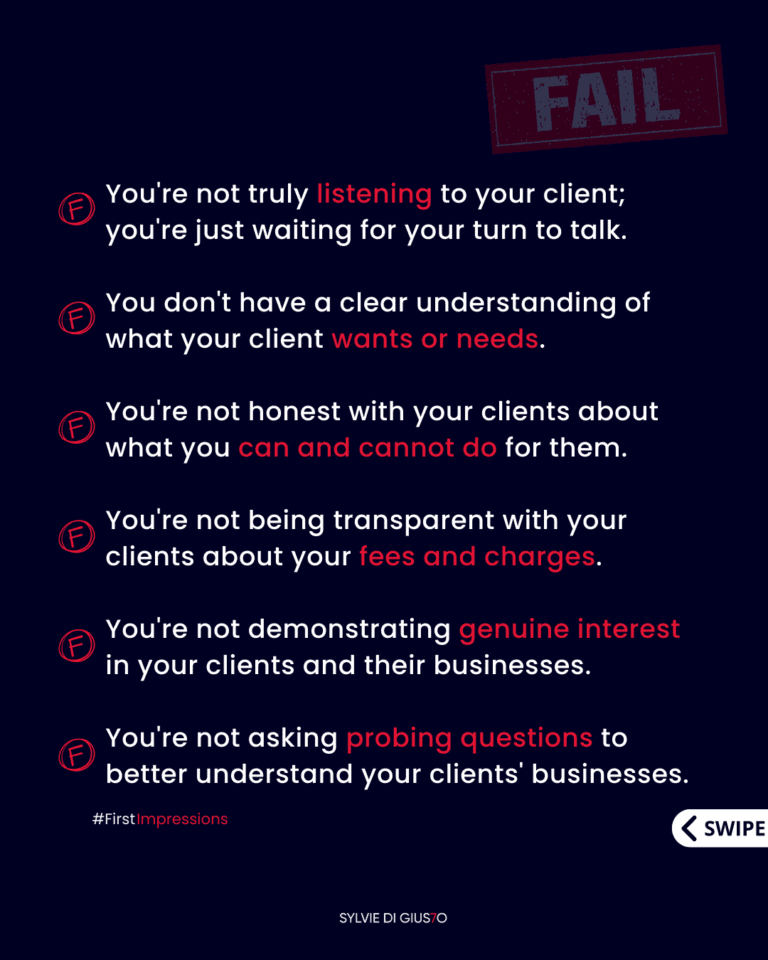
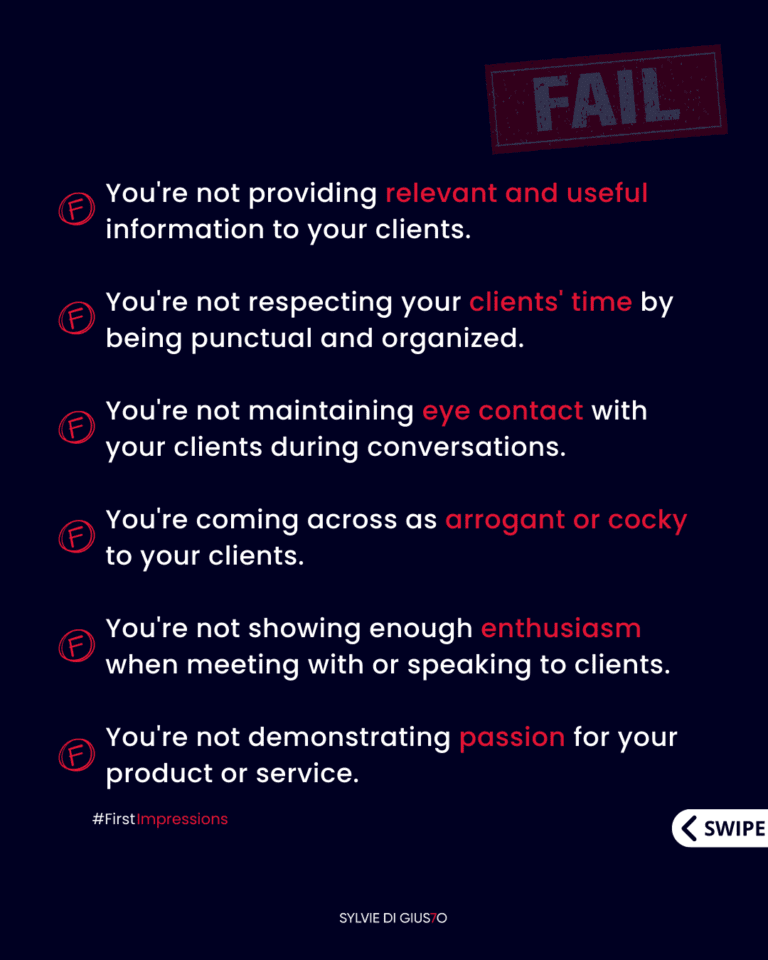
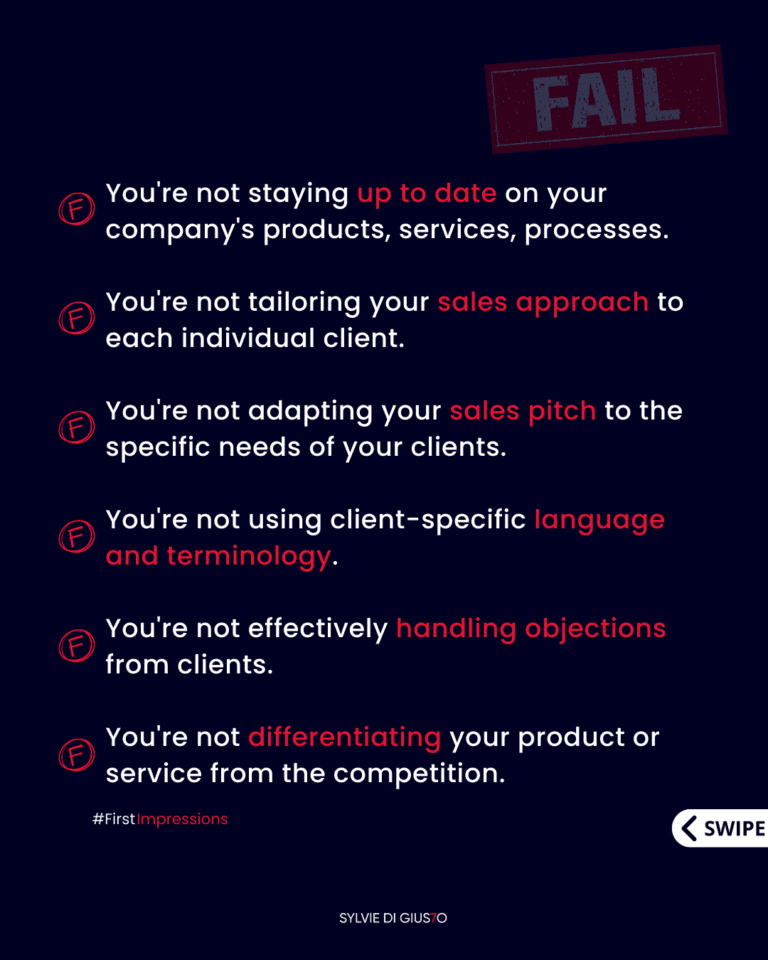
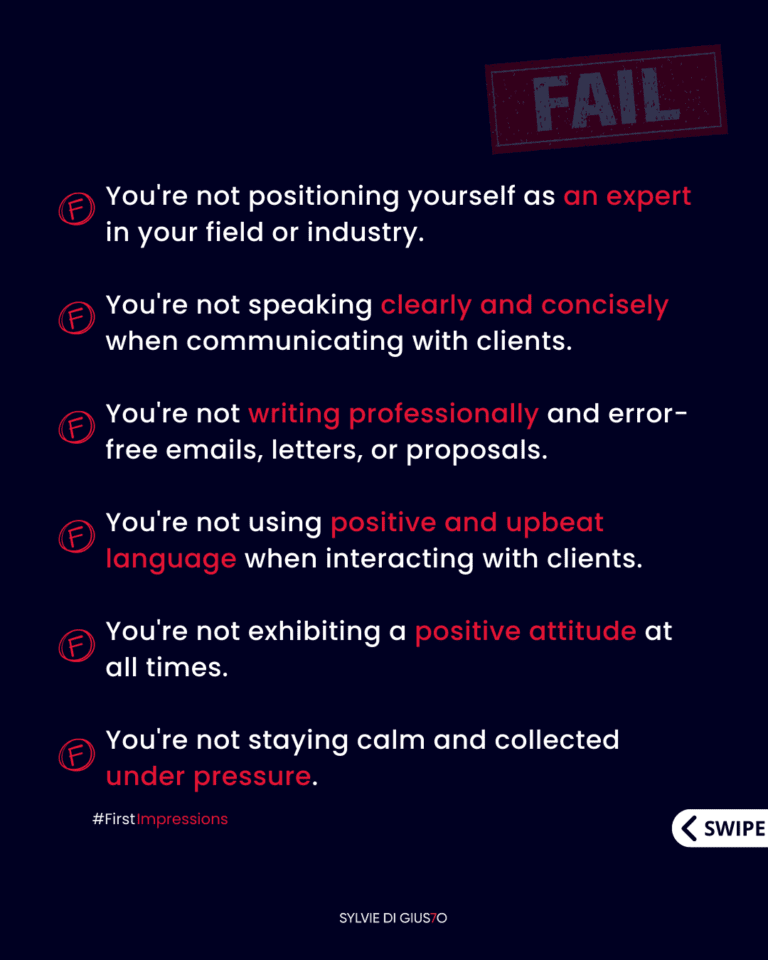
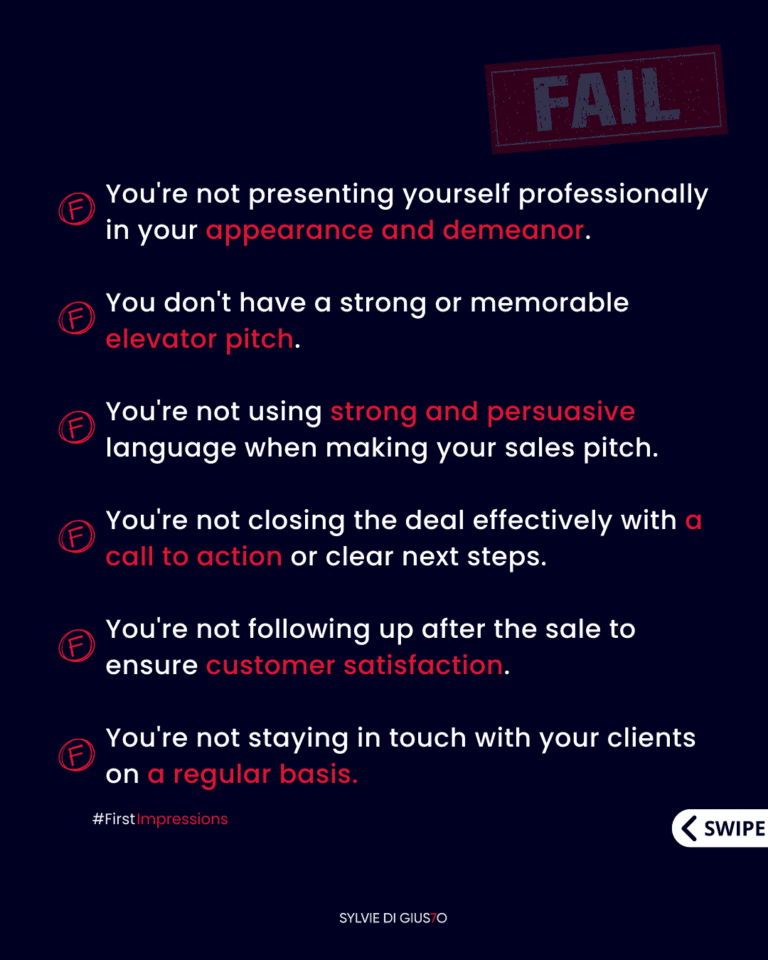
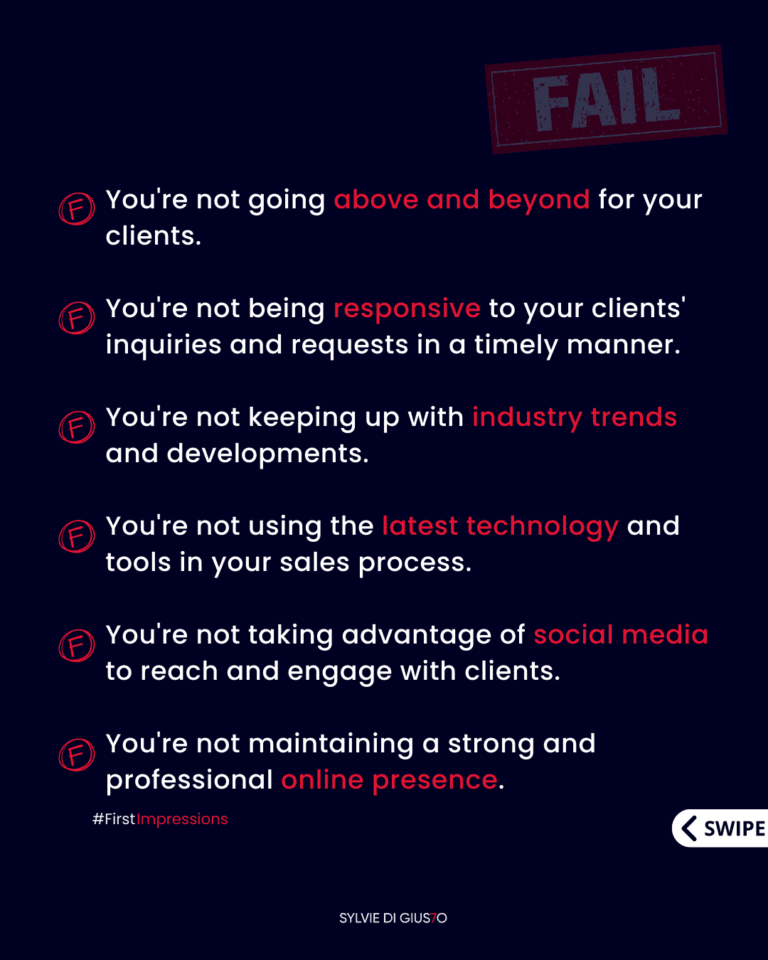
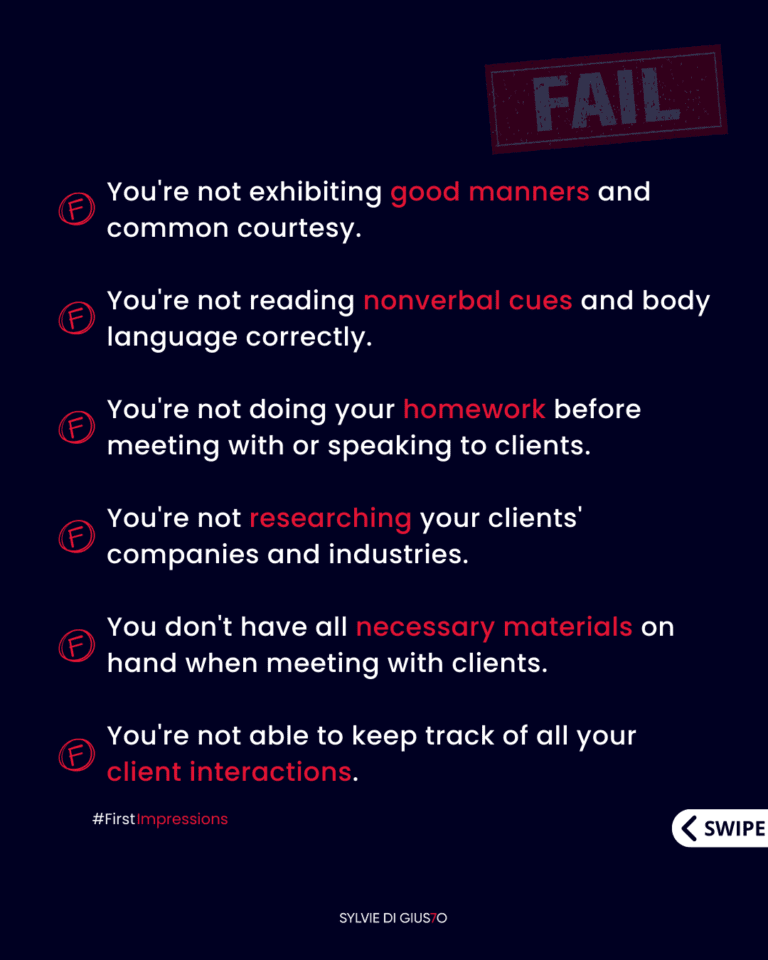
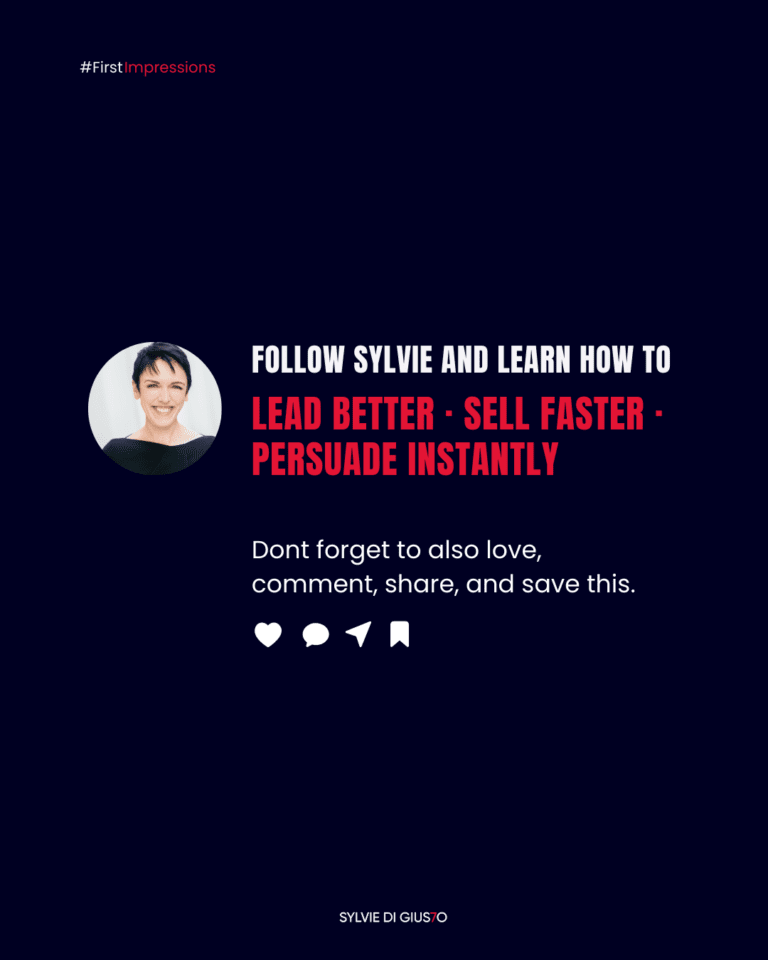
PS: Interested in more content like this? Make sure to follow me on Instagram. It’s where I visualize and publish my thoughts daily. I hope to see you there.




